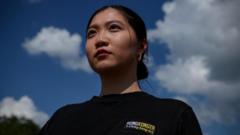In the tight race for Canada’s parliamentary election, Joe Tay—a Conservative candidate and outspoken critic of the Chinese government—has adopted an unusually quiet campaign strategy. As he contends for the Don Valley North seat, he has avoided traditional campaign tactics like door-to-door canvassing or public appearances, mainly out of concern for his safety. The situation escalated when the Chinese government put a $130,000 bounty on his head, urging citizens to help with his arrest.
In addition to this, Canadian authorities disclosed that Tay has been the target of organized online campaigns linked to China, intending to undermine his candidacy by spreading disinformation about him. This internet assault paints Tay as a criminal, while simultaneously attempting to minimize the visibility of his campaign, as noted by Vanessa Lloyd, head of Canada’s intelligence agency. Tay’s critical stance against the erosion of freedoms in Hong Kong has made him a significant figure during this election, especially within a constituency rich in Chinese-Canadian voters. As this drama unfolds, Tay’s determination shines through, showcasing the intersection of political struggle and personal safety in global politics.
In addition to this, Canadian authorities disclosed that Tay has been the target of organized online campaigns linked to China, intending to undermine his candidacy by spreading disinformation about him. This internet assault paints Tay as a criminal, while simultaneously attempting to minimize the visibility of his campaign, as noted by Vanessa Lloyd, head of Canada’s intelligence agency. Tay’s critical stance against the erosion of freedoms in Hong Kong has made him a significant figure during this election, especially within a constituency rich in Chinese-Canadian voters. As this drama unfolds, Tay’s determination shines through, showcasing the intersection of political struggle and personal safety in global politics.


















